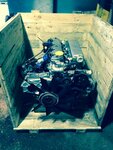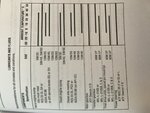I'm getting set to get my truck back on the road soon. I'm starting this thread to see what you all can tell me about owning a 300Tdi. When thinking about maintaining a running vehicle, I constantly find myself re-asking all the same old questions. I'm hoping that by having this thread here, I will have a place to jump directly to, in order to find the answers to these basic questions:
- What type/brand of oil?
- What type/brand of coolant?
- What type/brand of oil filter?
- What type/brand of fuel filter, and what micron size?
- Where do you buy these things online?
- What is a normal running oil pressure?
- What is a normal running EGT?
- What is a normal running water temp?
- Do you have any tips, tricks, or alternate parts that you use?
- What are some warning signs of impending doom?

